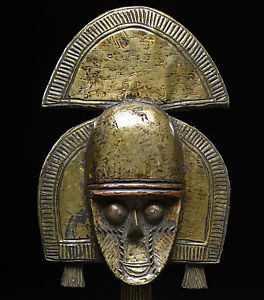| Location: |
Nigeria | | Population: |
351,000 |
| Language: |
Khana |
| Neighbors: |
Ibibio, Igbo, Ijo |
| Types of Art: |
The Ogoni celebrate the Yam festival with masked dances and this is also a popular holiday in Nigeria. The first yams to be harvested are offered to the divini ties and the ancestors as a way of thanking them for their benevolence and generosity. The Yam Festival is held not only in Africa, but in other places with large West African communities, such as the United Kingdom. It is also the same spirit of giving thanks and expressing gratitude for the blessings of life bestowed upon by the ancestors that informs the African American holiday, Kwanzaa, created in 1966 by Maulana Karenga.
|
| History: |
Archaeological and linguistic evidence suggests the Ogoni have inhabited the Niger Delta for up to 500 years. They established an organized social system which worked under a monarchy and under which men and women of courage and ability enjoyed a special status. During the slave trade, Ogoniland lay on the slave route from the hinterland to the coastal slave markets. However, no Ogoni man or woman was taken as a slave. Marriage with a neighbour, except the Ibibio, was forbidden by Ogoni customs and tradition. This way, the Ogoni people were able to live in relative isolation during the era of the slave trade. When other forms of trade were introduced into the region in the second half of the 19th century, weapons were purchased and wars became the order of the day. After the Berlin Treaty of 1885, Nigeria came under British colonial rule, but it was not until 1901 that British forces arrived in Ogoniland. The cultural diffences led to resistance on the side of the Ogoni people, but as they were not strong enough to resist the British patrols the Ogoni people were finally subjugated in 1914. The British saw Nigeria in terms of three major ethnic groups: the Hausa-Fulani, the Yoruba and the Igbo, thereby ignoring more then 250 smaller peoples, including the Ogoni. The Ogoni were regarded with contempt by all other groups in the Delta region and were often positioned at the bottom of the social ladder.
The true origins of the Ogoni people are not very well-known. One theory is that they migrated into the area from across the Imo River. A second theory is that the Ogoni came in boats from Ghana and settled in the southern part of the area. Believers in this theory point to the name by which most of the Ogoni peoples call themselves (Khana) as a pointer to the Ghana origins of the Ogoni people. |
| Economy: |
The Ogoni are an agricultural and fishing society. Yam and cassava farming are important ways of making a living, although the revenues of these products are not very high. The most important export product of Nigeria is oil, but the Ogoni people have never profited from these exports. Once the 'food basket' for the Niger Delta and beyond, Ogoniland's agricultural production has now been severely reduced. This is partly due to loss of farmlands through oil polution and partly to soil fertility problems arising from acid/alkaline rain caused by gas flaring. Large areas of fresh and salt water resources as fishing grounds have also been rendered useless by oil spills. Food is becoming increasingly expensive and potential farmers are too poor to pay for seeds and labour. Poverty has worsened in the Ogoni areas during the last years. Nearly all oil workers are people coming from outside the area whom the local people have had to compete with for basic commodities. Besides the oil installations and refineries there are no manufacturing industries in Ogoni to reduce unemployment. This situation increasingly results in psycho-social degradation.
|
| Political Systems: |
Ogoniland consists of six kingdoms: Babbe, Eleme, Gokana, Ken-Khana, Nyo-Khana, and Tai. Within Ogoniland four main languages are spoken, which, although related, are mutually unintelligible. Linguistic experts classify the Ogoni languages of Khana, Gokana, and Eleme as a distinct group within the Beneu-Congo branch of African languages or, more particularly, as a branch in the New Beneu-Congo family.
|
| Religion: |
Despite the introduction of Christianity, (96% Christian), many aspects of the indigenous Ogoni culture and religion are still evident. The land on which they live and the rivers that surround them are very important to the Ogoni people. They not only provided enough food, they are also believed to be a god and are worshiped as such.
This explains why the Ogoni people have so many difficulties with the degradation of the environment as a result of oil pollution.
The fruit of the land, especially yams, are honoured in festivals. The annual festival of the Ogoni people is held during the period of the yam harvest.
The planting season is not just a period of agricultural activity, but it is a spiritual, religious and social occasion. 'Tradition' in Ogoni means in the local tongue (doonu kuneke) the honouring of the land. The Ogoni people believe that the soul of every human being has the ability to leave its human form and enter into that of an animal, taking on the shape of that animal. These characteristics show that nature is very important for the Ogoni people. |
| Credit: |
http://www.joshuaproject.net/people-profile.php?peo3=19639&rog3=NI |
|

